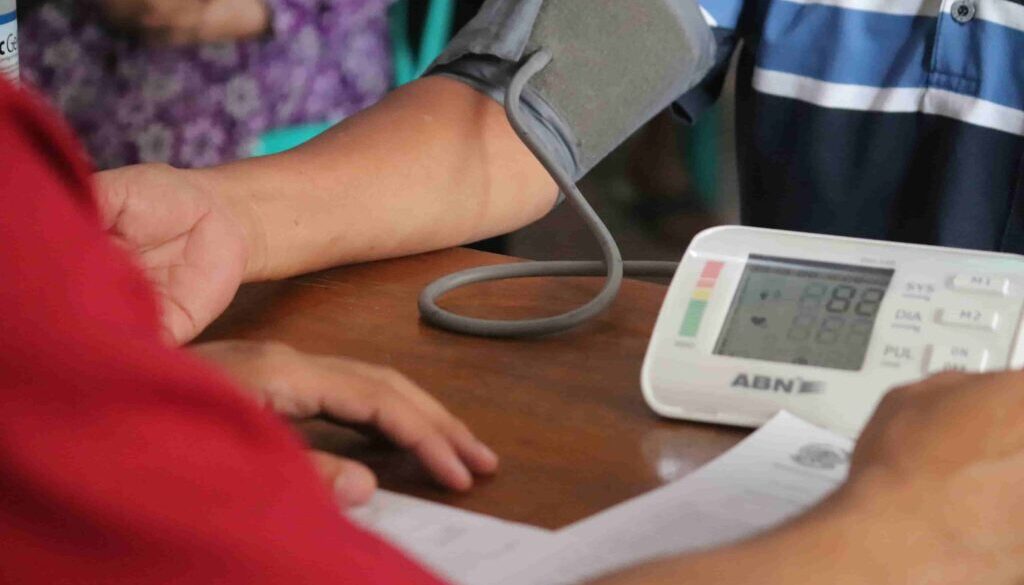Hypertension In Dubai
Understanding High Blood Pressure: All You Need to Know
Hypertension, often referred to as high blood pressure, is a common yet serious medical condition that affects millions of people worldwide. Recognizing symptoms and understanding blood pressure levels is crucial for proactive management, as hypertension stands as a primary factor in the development of heart disease, stroke, and other cardiovascular complications.
In Dubai, Dr. V J Sebastian is the best Senior Consultant Cardiologist for hypertension. He is well-known for his proficiency in handling this condition and assisting patients in achieving optimal cardiovascular wellness.
What is Hypertension
Hypertension is when your blood pressure levels stays high, above the normal range, for a long time. High blood pressure, also known as hypertension, is determined when the blood pressure reading is 130/80 millimeters of mercury (mm Hg) or higher. Readings below 120/80 mm Hg are considered normal
Blood pressure readings consists of two numbers:
- The top number, known as systolic pressure, measures the pressure in the arteries when the heart beats.
- The bottom number, called diastolic pressure, measures the pressure in the arteries between heartbeats.
Symptoms
Here are some symptoms of hypertension :
- Headaches: While headaches can have different causes, persistent ones, especially at the back of the head, might be a sign of hypertension.
- Shortness of Breath: Breathing trouble or feeling short of breath can happen when the heart needs to exert more effort to push blood through narrowed arteries.
- Dizziness or Vertigo: Feeling lightheaded, dizzy, or experiencing vertigo can be a symptom of hypertension, especially when standing up quickly.
- Chest Pain: Chest pain or tightness could indicate hypertension, suggesting that the heart may be having difficulty pumping blood efficiently.
- Vision Problems: Blurred vision or seeing spots in your vision can occur. This is due to hypertension affecting the blood vessels in the eyes.
- Fatigue: Feeling excessively tired or fatigued even after resting can be a symptom of hypertension . As the heart is working harder than usual.
- Nosebleeds: While not as common, frequent nosebleeds can sometimes be a symptom of hypertension .Especially if they occur without any apparent cause.
- Irregular Heartbeat (Arrhythmia): Hypertension can lead to irregular heartbeats, palpitations, or a sensation of pounding in the chest.
If you experience any of the above symptoms of hypertension, it’s advisable to visit a clinic near you in Dubai for further evaluation and treatment by specialist doctors.
Different Blood Pressure Categories
Blood pressure is classified into stages depending on its levels, which helps determine appropriate treatment:
- Stage 1 hypertension: If the top number falls within the range of 130 to 139 mm Hg, or the bottom number falls within the range of 80 to 89 mm Hg.
- Stage 2 hypertension: When the upper number reaches 140 mm Hg or more, or the lower number is 90 mm Hg or higher.
Sometimes, the bottom number of blood pressure levels remains normal (below 80 mm Hg), while the top number is high .This is called isolated systolic hypertension, and it’s common in people who are 65 years old and above.
The Dangers of Uncontrolled Hypertension
Hypertension doesn’t show noticeable symptoms until it progresses to advanced stages or causes severe complications, which is why it is also called the “silent killer”.
If left unchecked, hypertension can harm blood vessels and organs, heightening the risk of serious health issues including :
- Heart Disease: Hypertension can cause coronary artery disease, heart failure, and heart attacks.
- Stroke: Hypertension damages blood vessels in the brain, increasing the risk of stroke.
- Kidney Damage: Hypertension can impair kidney function and contribute to chronic kidney disease.
- Vision Loss: Hypertension can harm blood vessels in the eyes may be affected, possibly resulting in vision issues or even blindness.
- Peripheral Artery Disease: Decreased blood circulation to the limbs due to narrowed arteries can cause pain. Additionally, it can increase the risk of infections and tissue damage.
Diagnostic Tests for Hypertension
If you’re diagnosed with hypertension symptoms ,it’s essential to visit a clinic near you in Dubai .Your physician might suggest various tests to identify potential causes:
- Ambulatory Monitoring: This test monitors blood pressure levels over a longer duration, typically over six or 24 hours, to track changes throughout the day. It’s known as ambulatory blood pressure monitoring. However, availability of monitoring devices may vary among medical centers.
- Lab Tests: Healthcare providers conduct blood and urine tests to assess conditions that could contribute to or worsen high blood pressure. These tests may include checking cholesterol and blood sugar levels, as well as assessing kidney, liver, and thyroid function.
- Electrocardiogram (ECG or EKG): This simple and painless test measures the heart’s electrical activity, indicating its rhythm and rate. During an ECG, healthcare providers position electrodes on the chest and sometimes on the arms or legs. These electrodes link to a machine that prints or shows the results.
- Echocardiogram: This noninvasive examination employs sound waves to generate detailed images of the heart as it beats. It provides insights into how blood flows through the heart and its valves.
Prevention and Treatment
Treatment for hypertension typically involves a combination of lifestyle modifications and medications. Here are some common treatments for hypertension that you can find near you in Dubai:
Lifestyle Modifications:
Healthy Diet: Focus on fruits, vegetables, whole grains, and lean proteins while reducing sodium intake, saturated fats, and processed foods, can assist in lowering blood pressure.
Regular Exercise: Engaging in aerobic exercise for at least 30 minutes most days of the week can help lower blood pressure. Activities like brisk walking, swimming, cycling, or jogging offer benefits.
Weight Management: If you’re overweight or obese, losing some can really help bring down your blood pressure. Even dropping 5-10% of your total body weight can significantly lower your blood pressure.
Quit Smoking: Smoking can elevate blood pressure, increasing the risk of heart disease and stroke. Quitting smoking is essential for managing hypertension and improving overall health.
Reduce Stress: Practicing relaxation methods such as mindful breathing, mindfulness exercises, gentle stretching, and muscle relaxation can help lower blood pressure.
Medications:
Diuretics: Diuretics, commonly called water pills, aid in removing excess sodium and water from the body, which decreases blood volume and subsequently lowers blood pressure.
Angiotensin-Converting Enzyme (ACE) Inhibitors: ACE inhibitors aid in relaxing blood vessels by preventing the production of angiotensin II, a hormone known for constricting blood vessels.
Angiotensin II Receptor Blockers (ARBs): ARBs function similarly to ACE inhibitors. They inhibit the effects of angiotensin II, resulting in blood vessel relaxation and a decrease in blood pressure.
Calcium Channel Blockers (CCBs) relax blood vessels by preventing calcium from entering cells and lowering blood pressure.
Beta-Blockers: Beta-blockers reduce heart rate and cardiac output, thereby lowering blood pressure. Healthcare providers often combine them with other medications.
Alpha-Blockers: Alpha-blockers help relax blood vessels by blocking the action of certain nerve impulses.
Renin inhibitors : They reduce the production of renin, an enzyme involved in regulating blood pressure.
Despite its silent nature, hypertension is a manageable condition when detected early through symptoms and treated appropriately specialist doctors in near you in Dubai. By focusing on prevention and adopting healthy habits, people can manage their blood pressure better and reduce the chances of problems caused by hypertension. This helps them live longer and healthier lives.




